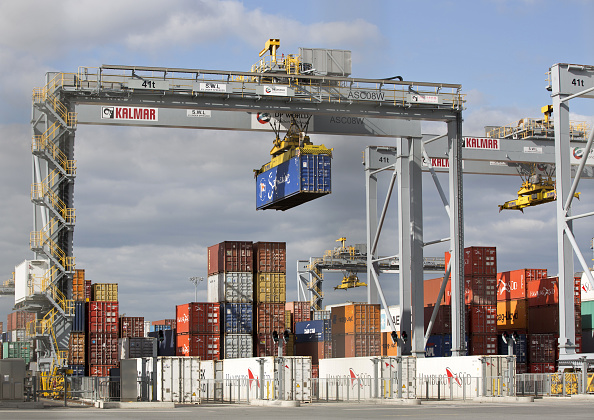UK to create up to 10 freeports to boost trade after Brexit

The UK is planning to create up to 10 freeports to boost trade after Brexit, it said today.
New Prime Minister Boris Johnson, who is committed to taking the UK out of the EU by 31 October, floated the idea during his campaign for the Conservative leadership.
The government said ports and airports around the country will be able to bid to become one of the freeports and announced it had created a new freeports advisory panel, including technology and tax specialists, to help them set it up.
Freeports are areas where imported goods and be processed or held free of customs duties before being exported again.
They can also be used to import raw materials and make finished goods for export.
Read more: Former banker Sajid Javid’s first job as chancellor? To stand up to Boris Johnson
“We are exploring freeports as an innovative way to drive growth and support thousands of high-skilled jobs across the UK,” Rishi Sunak, chief secretary to the Treasury, said in a statement.
“We will focus on those areas that could benefit the most, as we look to boost investment and opportunity for communities across the country.”
Freeports could cut down on unnecessary checks and paperwork as well as having customs and tax benefits for firms, the government said, reducing costs and bureaucracy and encouraging manufacturing businesses to set up.
Labour’s shadow secretary of state for international trade, Barry Gardiner MP, criticised the plans.
“This is not new investment and growth. It is a race to the bottom that will have money launderers and tax dodgers rubbing their hands with glee. Freeports and free enterprise zones risk companies shutting up shop in one part of the country in order to exploit tax breaks elsewhere, and, worst of all, lower employment rights,” he said.
“The British people did not vote for this new administration and they certainly did not vote to see their jobs and livelihoods threatened in favour of gifting further tax breaks to big companies and their bosses,” he added.
Read more: The UK trade team had better up its game – and fast
Teesport and the Port of Tyne in northeast England, Milford Haven in Wales and London Gateway are among those who have expressed an interest in becoming freeports, the government said.
Consultancy and construction firm Mace last year said creating seven freeports in the north of England could add £9bn a year to Britain’s GDP and create 150,000 jobs.
Jason Millett, Mace’s chief operating officer for consultancy, today said: “Mace’s pioneering research kick-started the debate about free ports in the UK and their potential benefits. Our polling shows that they are popular across the political spectrum, with eight in 10 people supporting their creation around the country, and would give a possible economic bonus of £1,500 per person in areas they are created.
“They already exist in many countries right around the world and it’s great that the UK now has plans to catch up. I look forward to hearing more about the government’s proposals and locations selected over the next few months and hope that they decided to ‘supercharge’ them by combining them with enterprise zones which is the recommendation our report put forward.”
The UK Trade Policy Observatory, run by the University of Sussex and Chatham House think-tank, questioned Mace’s figure, saying much of it would just be redistributing economic activity from elsewhere in the country.
“Policy impact evaluations often suggest that the net benefit of free zones is limited,” it said in a research paper earlier this year. “The US experience is not very illuminating: whilst there are many jobs in the US Foreign-Trade Zones, there is little evidence of how many are net creations.”